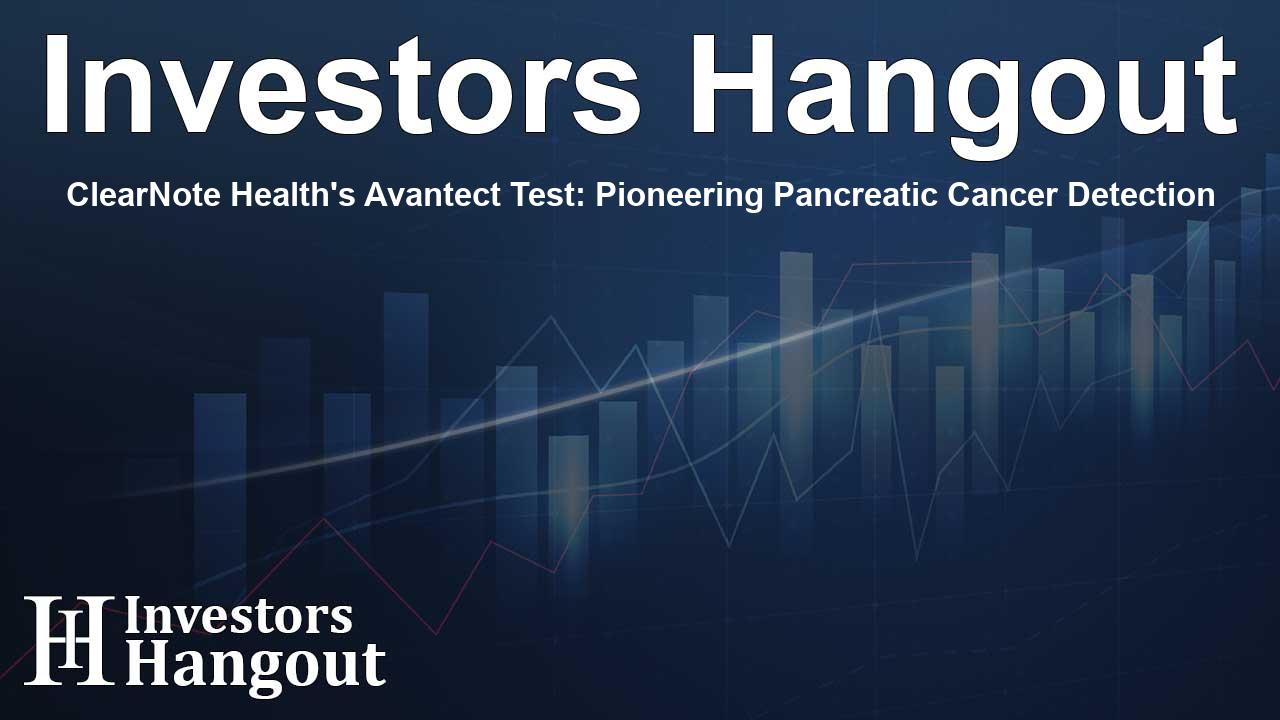ClearNote Health's Avantect Test: Pioneering Pancreatic Cancer Detection

Innovative Advances in Pancreatic Cancer Detection
ClearNote Health has taken a significant step in the realm of pancreatic cancer detection, with their Avantect® Test being selected for a major study focusing on early diagnosis in high-risk patients. This collaboration with teams from Southampton will form part of the largest study of its kind, aimed at identifying pancreatic cancer at its earliest stages.
Collaboration with Research Teams
The initiative, which involves leading researchers at the Southampton Clinical Trials Unit, emphasizes the link between pancreatic cancer and type 2 diabetes. This large-scale study will target nearly 15,000 patients who have recently been diagnosed with type 2 diabetes, as they are statistically more vulnerable to pancreatic cancer. The study is pivotal as it not only seeks to enhance detection methods but also aims to understand better the relationship between these two serious health conditions.
Understanding Diabetes and Pancreatic Cancer Links
Research indicates that individuals with newly diagnosed type 2 diabetes have a significantly higher risk of developing pancreatic cancer—almost eight times more than the general population. Clinically, symptoms of undiagnosed pancreatic cancer can sometimes manifest as diabetes symptoms, complicating the diagnostic landscape.
The SAFE-D Study: Goals and Objectives
The Surveillance of pAncreatic health aFter diabEtes Diagnosis (SAFE-D) study will be methodical in examining the presence of pancreatic cancer signals in patients recently diagnosed with type 2 diabetes. This single-blinded, randomized controlled trial meticulously orchestrated by surgical experts promises to provide important insights that could reshape diabetes care practices and cancer detection protocols.
Aiming for Early Detection
Zaed Hamady, noted for his surgical expertise in pancreatic cancer, expressed hope that the study will cement faith in the Avantect test’s potential to catch pancreatic cancer early. Current statistics reveal that treatment options for advanced-stage pancreatic cancer are scarce, which emphasizes the critical need for such early detection capabilities.
Long-Established Relationships in Research
ClearNote Health is forming vital partnerships with institutions like the University Hospital Southampton NHS Foundation Trust. Dr. Mikayala King from the Trust remarked on the significance of sponsoring this pioneering study, highlighting the potential benefits for patients facing this inscrutable disease.
How the Avantect Test Works
The Avantect Pancreatic Cancer Test is a unique blood test designed for those at high risk of pancreatic cancer, including individuals aged 50 and above with newly diagnosed type 2 diabetes. Utilizing cutting-edge biomarkers, including 5-hydroxymethylcytosine (5hmC) in cell-free DNA, this test enhances the ability to detect pancreatic cancer in its nascent stages, contrasting starkly with traditional detection methods.
A Vision for the Future of Healthcare
Samuel Levy, Chief Scientific Officer at ClearNote Health, emphasized the transformative potential of early cancer detection technology. As trends indicate a pressing need for advances in cancer diagnostics, ClearNote’s innovative approach may indeed alter the future landscape of cancer treatment and patient survival rates.
About ClearNote Health
ClearNote Health is a forward-thinking company dedicated to bolstering early detection and monitoring of severe cancers. With roots in prestigious research conducted at Stanford University, ClearNote offers patented platforms that incorporate the latest advancements in artificial intelligence to differentiate between healthy and cancerous cells based on blood samples. Their Avantect® diagnostic tests are developed to detect cancers at stages where treatment is most effective, all within a supportive healthcare framework.
Frequently Asked Questions
What is the Avantect Pancreatic Cancer Test?
The Avantect Pancreatic Cancer Test is a blood test designed to detect early indicators of pancreatic cancer, particularly in high-risk patients.
How many patients will participate in the SAFE-D study?
Up to 15,000 patients newly diagnosed with type 2 diabetes will participate in the SAFE-D study to investigate the early signals for pancreatic cancer.
What is the significance of the study's findings?
The findings aim to bolster early detection methods which can lead to more effective treatment options and improved patient outcomes.
Who is leading the SAFE-D study?
Zaed Hamady, a consultant surgeon specializing in pancreatic cancer, is leading the SAFE-D study at the University Hospital Southampton.
What is ClearNote Health's mission?
ClearNote Health is committed to improving early cancer detection and monitoring through innovative technologies and research, ultimately aiming for better patient outcomes.
About Investors Hangout
Investors Hangout is a leading online stock forum for financial discussion and learning, offering a wide range of free tools and resources. It draws in traders of all levels, who exchange market knowledge, investigate trading tactics, and keep an eye on industry developments in real time. Featuring financial articles, stock message boards, quotes, charts, company profiles, and live news updates. Through cooperative learning and a wealth of informational resources, it helps users from novices creating their first portfolios to experts honing their techniques. Join Investors Hangout today: https://investorshangout.com/
Disclaimer: The content of this article is solely for general informational purposes only; it does not represent legal, financial, or investment advice. Investors Hangout does not offer financial advice; the author is not a licensed financial advisor. Consult a qualified advisor before making any financial or investment decisions based on this article. The author's interpretation of publicly available data shapes the opinions presented here; as a result, they should not be taken as advice to purchase, sell, or hold any securities mentioned or any other investments. The author does not guarantee the accuracy, completeness, or timeliness of any material, providing it "as is." Information and market conditions may change; past performance is not indicative of future outcomes. If any of the material offered here is inaccurate, please contact us for corrections.